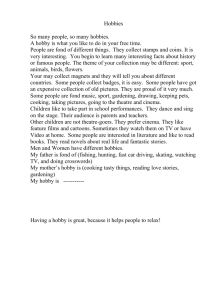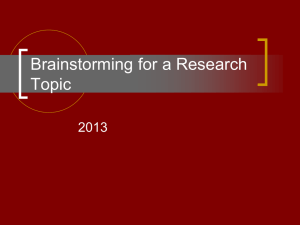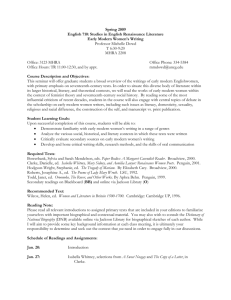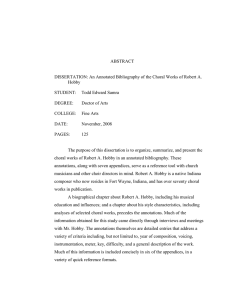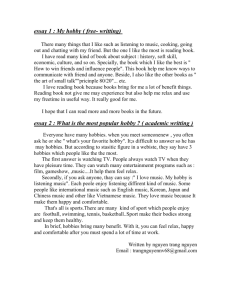In seventeenth-century England, “very few women, compared with men, wrote
advertisement
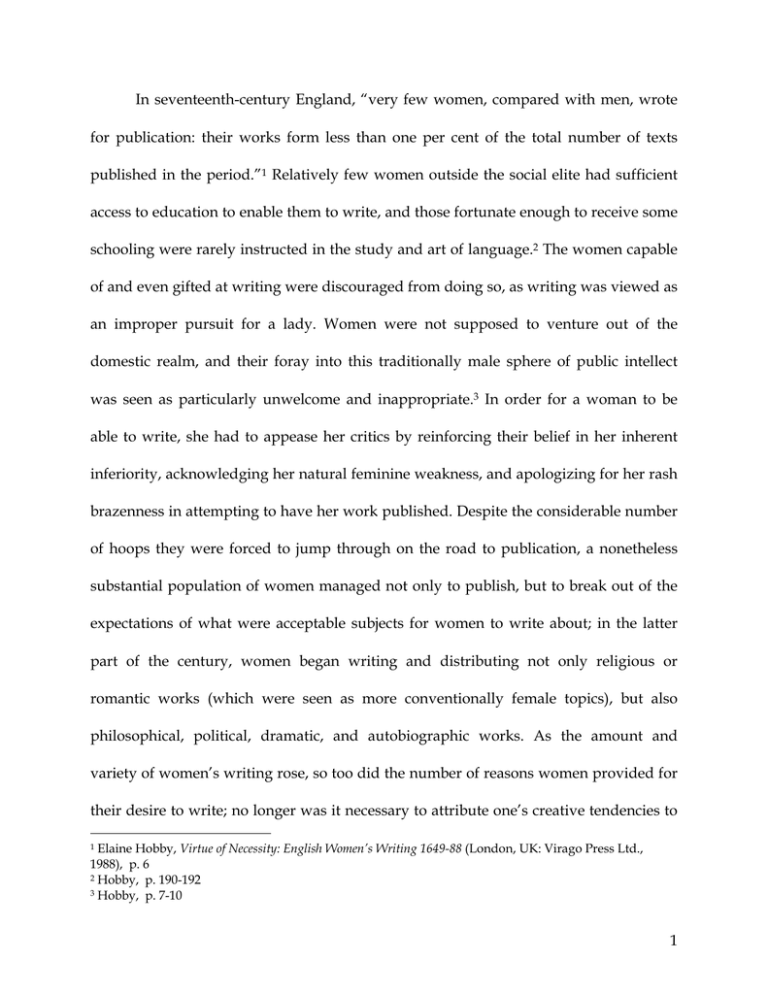
In seventeenth-century England, “very few women, compared with men, wrote for publication: their works form less than one per cent of the total number of texts published in the period.”1 Relatively few women outside the social elite had sufficient access to education to enable them to write, and those fortunate enough to receive some schooling were rarely instructed in the study and art of language.2 The women capable of and even gifted at writing were discouraged from doing so, as writing was viewed as an improper pursuit for a lady. Women were not supposed to venture out of the domestic realm, and their foray into this traditionally male sphere of public intellect was seen as particularly unwelcome and inappropriate.3 In order for a woman to be able to write, she had to appease her critics by reinforcing their belief in her inherent inferiority, acknowledging her natural feminine weakness, and apologizing for her rash brazenness in attempting to have her work published. Despite the considerable number of hoops they were forced to jump through on the road to publication, a nonetheless substantial population of women managed not only to publish, but to break out of the expectations of what were acceptable subjects for women to write about; in the latter part of the century, women began writing and distributing not only religious or romantic works (which were seen as more conventionally female topics), but also philosophical, political, dramatic, and autobiographic works. As the amount and variety of women’s writing rose, so too did the number of reasons women provided for their desire to write; no longer was it necessary to attribute one’s creative tendencies to Elaine Hobby, Virtue of Necessity: English Women’s Writing 1649-88 (London, UK: Virago Press Ltd., 1988), p. 6 2 Hobby, p. 190-192 3 Hobby, p. 7-10 1 1 God or an ephemeral muse, one could simply write for the sake of writing and have that be sufficient justification. Women began to say that they did not need a reason beyond themselves to write, and this establishment of both a female identity independent enough to have distinct drives and dreams and the growing desire of women to have their ideas and words heard outside of their diminutive domestic domain signaled the rise of the English woman writer. The majority of popular (or at least well-known) published women belonged to a relatively elite social class or had some access to the royal court; the hurdles that a woman of a less privileged class had to surmount were essentially prohibitive for all but the most eager and persistent potential writer. Aemilia Lanyer, Lady Mary Wroth, Katherine Philips, Anne Killigrew, and Margaret Cavendish, to list a few of the most enduring female writers of the time, were all either born into aristocratic, upper-class families or married into them. While proximity to the court certainly provided a forum for expressing ideas and a medium for public, creative discourse, the primary asset of the nobility that facilitated the growth of women’s literary voices was their access to education. Lower-class women were very rarely provided with an education; “whatever degree of education was available to the poor, boys were more likely than girls to receive it.”4 Without some training in language and the literary arts, the likelihood that a woman would turn to writing on her own was extremely small. In Philosophical and Physical Opinions (1655), Margaret Cavendish asserts that: 4 Hobby, p. 192 2 We are become like worms that only live in the dull earth of ignorance, winding ourselves sometimes out by the help of some refreshing rain of good educations, which seldom is given us; for we are kept like birds in cages to hop up and down in our houses, not suffered to fly abroad to see the several changes of fortune, and the various humours, ordained and created by nature; thus wanting the experiences of nature, we must needs want the understanding and knowledge so consequently prudence, and invention of men: thus by an opinion, which I hope is but an erroneous one in men, we are shut out of all power and authority, despised, and laughed at, the best of our actions are trodden down with scorn, by the overweening conceit men have of themselves and through despisement of us.5 Without education, women could not even recognize the wealth of knowledge and beauty they were being shut out of; even women fortunate enough to be literate were not necessarily well-versed in the art of writing, and even fewer had banks of memories and experiences rich enough from which to easily mine material and inspiration. The social hierarchy present in England was such that women were not given the opportunity to achieve parity with men, socially or creatively, but Cavendish was convinced that “if we were bred in school to mature our brains, and to mature our understandings…we might bring forth the fruits of knowledge.”6 The absence of education as a result of the long-standing English patriarchal social structure made creative writing by women an extremely rare occurrence, as so few women had the ability or opportunity to do so. [Cavendish] shows women’s limited education and inferior social position to be tightly linked in the ideas and practices of patriarchy: women are excluded both from the schoolings and from the experiences which would allow them to achieve great things.7 Qtd. in Hobby, p. 190 Qtd. in Hobby, p. 191 7 Hobby, p. 190 5 6 3 Men were simply not welcoming women into their spheres of academic and creative discussion and consequently giving them no place in the intellectual discourse of the time. Before an Englishwoman even began the writing process, she had already been placed at an educational disadvantage to men; without comparable training, a woman had to have a much stronger drive and desire to write as she had to surmount social prejudices regarding not only women writers but also educated women as a whole. The failure of English society to provide the majority of women with a passable education was due in part to the general assumption that a woman’s place was in the home, and one did not need an education in language and literature in order to run a household. “Women belonged in the increasingly private sphere of the home: they were not supposed to be so bold- or so immodest- as to venture into the world of print.”8 The act of writing, and of pursuing publication, sent a woman outside her domestic realm into the broader world of public conversation (much to the chagrin of social conservatives). Dominant discourses of gender produced in religious, legal, and medical writings prescribed a model of the ideal woman as obedient, private, silent and chaste- a construction of femininity which made writing and especially publishing one’s work deeply transgressive acts for a woman.9 Publishing one’s work displayed a desire to venture beyond world traditionally assigned to women, which indirectly implied dissatisfaction with the confines of home and family. This apparent lashing out at the social structure was not taken well: 8 9 Hobby, p. 9 Anita Pacheco, Early Women Writers: 1600-1720 (Essex, UK: Addison Wesley Longman Ltd., 1998), p.7 4 A woman’s public speech (or writing) became symptomatic of sexual promiscuity, while both in turn signified a violation of her proper place: enclosed within the domestic sphere.10 The poetess quickly became associated with the punk, or prostitute,11 which even further raised the stakes of publishing one’s poetry. A woman’s honor was still, at this point, her most valuable (and necessary) asset, and any potential attack on her virtue, merited or not, could be socially catastrophic.12 The apparent commoditization of writing was one of the main critiques against women writing; poetry was held up as an ideal, intangible art form that should not be sullied with notions of money and publication rights. Jane Barker, in her Poetical Recreations (1688) commented that “poverty’s the certain fate/ Which attends a poet’s state.”13 Aphra Behn, one of the first women to make her living as a professional writer/poet, was attacked for her upfront interest in profiting from her work; the exchange of her words for money was seen as a straightforward prostitution of ideas. The act of publishing was seen as tainting both the art of writing (although the same critique was rarely applied to male poets) and the women sending their work out into the public, and the few women brave, persistent, or determined enough to face the reproach of society at large had to balance their personal virtue and honor with the seeming impropriety of publishing. Pacheco, p.7 Pacheco, p. 7-8 12 Hobby, p. 2-7 13 Qtd. in Angeline Goreau, Reconstructing Aphra: A Social Biography of Aphra Behn (New York: The Dial Press, 1980) p. 236 10 11 5 While women writing as a whole was not particularly supported in English society in the seventeenth century, “entirely private forms of writing not destined for publication and dealing with what limited experience might come within the circumference of a lady’s life,”14 were far more culturally acceptable outlets of female creativity. A woman had to put on the pretence of not desiring her works to be published, of merely writing for personal amusement rather than public recognition. Katherine Philips, the “matchless Orinda,” was lauded for her modesty, perceived seclusion in Wales, and intention of writing strictly personal poems, when in fact she frequently traveled and visited friends (creating the Society of Friendship, which celebrated female camaraderie and poetry) and almost definitely aimed for her work to be read by a community outside her immediate family. 15 Whether Philips intended to ‘publish’ her poems through a bookseller or, what seems more likely, to circulate them among an increasingly large and more influential network of ‘friends’, she always thought of her poems as having a public audience.16 In order to receive what popular acclaim she was able to garner, Philips, subconsciously or not, put on an elaborate show to create the impression that she was an unwilling poet and that the publication of her work was wholly contrary to her original intent and current desire. Mary Wroth, in a letter to the Marquess of Buckingham, stated that I have with all care caused the sale of [my booke] to bee forbidden, and the books left to bee shut up, for thos that are abroad, I will likewise doe my best to get them in, if itt will please your Lordship to procure mee the kings warrant to that effect, Angeline Goreau, qtd. in S.P. Cerasano and Marion Wynne-Davies, Readings in Renaissance Women’s Drama: Criticism, history, and performance 1594-1998 (New York: Routledge, 1998), p.246 15 Carol Barash, English Women’s Poetry, 1649-1714: Politics, Community, and Linguistic Authority (New York: Oxford University Press Inc., 1996) p.61-62 16 Barash, p.63 14 6 without which non pleased to lett mee getting in of books purposing to have parforme.17 will deliver them to mee, besides that your Lordship wilbe have that which I sent you…what I ame able to doe for the (which from the first were solde against my minde I never had them published) I will with all care, and diligence For all her seeming protestations that she never intended for her books to be published, the fact that she sent Marquess her book implies that her purposes were somewhat more along the line of public recognition. This modest posturing, however, was necessary in order for a woman’s work to be given any consideration whatsoever. For a woman to get her work published, she had to be not only cagey about her aim for publication but also completely aware of the ideal female role and embrace it (or at least put on the semblance of accepting it). Virtually all of the prologues and openings of any English woman’s writing in the early and middle seventeenth century included an apology for her venturing beyond the traditional female sphere and a reminder of her inherent female weakness and her own unworthiness as a writer. In the opening of The World’s Olio (1655), even Margaret Cavendish, one of the more boundary-pushing women of the time, wrote that “it cannot be expected I should write so wisely or wittily as Men, being of the Effeminate Sex, whose Brains Nature hath mix’t with the coldest and softest Elements.”18 The act of writing, and particularly of publishing, was an affront to traditional perceptions of what a woman could (and should) do, and in order to slide past the cultural restrictions of modesty, decency, and silence, women writers adapted; the pretenses of private writing and the self-critical, humbling introductions to 17 18 Qtd. in Pacheco, p.40 Qtd. in Pacheco, p.135 7 their work were a necessary price to pay for the privilege of finally having their words published and distributed. The first genre of writing that was moderately accepted for women to contribute to without substantial threat of public reproach was religion (which had more traditionally been a part of the accepted female sphere of experience). Well over half the texts published by women between 1649 and 1688 were prophecies. These were written by women who present themselves as divinely inspired counterparts of the Old Testament prophets, whose role was to report and interpret God’s messages to His people….[It was shown that] women could be perceived as particularly suitable vessels for God’s messages. Their lowly status, it was reasoned, would make them less predisposed to the sin of taking pride in their heavenly inspiration, and demonstrated that, with God’s help, the last could indeed be made first. In addition, it was felt that women’s irrational and emotional essence and lack of strong personal will could make them especially receptive to the external voice of God.19 The mantle of religious prophecy, however, was too burdensome and restrictive for many women (although it was, during the 1640s and 1650s, an effective medium for voicing concerns about the crucial religious and political issues of the time20), who simply wished to write without having to act as an intermediary of God. In the preface to her translation of The Mirrour of Princely deedes and Knighthood (1578), a Spanish chivalric romance, Margaret Tyler appealed that “amongst al my il willers, some I hope are not so straight that they would enforce me necessarily either not to write or to write of divinitie.”21 Tyler’s translation opened the door for other women to write romances and later, love poetry. This transition from religion to romance was met with relatively Hobby, p. 26 Hobby, p. 27-31 21 Qtd. in Tina Krontiris, Oppositional Voices: Women as Writers and Translators of Literature in the English Renaissance (New York: Routledge, 1992), p.47 19 20 8 little resistance (though Tyler, in response to criticism of her choice of topic matter, which contained violence and other such unladylike themes, noted that she was translating a “story prophane, and a matter more manlike then becometh my sexe”22) primarily because of the easy parallels that could be drawn between motifs of love and the feminine character. A woman writing about love and romance was not seen as venturing dramatically beyond her traditional realm of expertise and was consequently less of a threat to conventional gender roles. Thomas Creech, while comparing reading Aphra Behn’s work to being seduced by her, mused that …thy Pen disarms us so, We yield our selves to the first beauteous Foe; The easie softness of thy thoughts surprise, And this new way Love steals into our Eyes;… In the same trance with the young pair we lie, And in their amorous Ecstasies we die…23 The appropriateness of love as a literary theme, however, depended on the manner in which it was treated. Behn also wrote many plays in the 1670s and 1680s, several of which were relatively bawdy comedies, in line with popular theater of the time. She, however, was attacked for being indecent and writing smut (although her plays were no more lewd and crude than those of her admired male colleagues)24. Behn complained that sexually explicit scenes like those she was under fire for “are never taken Notice of [if] a Man writ them.”25 As long as the subject and themes (and treatment thereof) did not vary too vividly from what was perceived as appropriate for Qtd. in Krontiris, p.46 Qtd. in Pacheco, p.184 24 S.J. Wiseman, Aphra Behn (Plymouth, UK: Northcote House Publishers Ltd., 1996), p.58-60 25 Wiseman, p.59 22 23 9 a woman to take interest in, popular opinion was placated with the notion that this was only a natural extension of a woman’s role within the house and family. Several topics, however, continued to be seen as dramatically outside the woman’s domain; science, philosophy, and politics were a few of the subjects thought to be well beyond the grasp of women, and consequently having no place in women’s writing. In 1651, a group of Leveller women submitted a petition to Oliver Cromwell decrying their dissatisfaction with the degree to which the revolution had been carried out. What shall we say? Our hope is even departed, and our expectation of freedom (the fruits of our blood shed, and expense of our estates) is removed far away; yea, the hope of our liberty is cut off like a weaver’s thumb. We have for many years (but in especial since 1647) chattered like cranes, and mourned like doves, yea with many sighs and tears have we presented our several complaints against God’s and our enemies; but we are hitherto so far from gaining redress, as that our eyes behold them still exalted to bear rule over us: and thus for felicity, we reap bitter grief; for freedom, slavery; for true judgement, justice and mercy, injustice, tyranny, and oppression; because the head of tyranny was cut off in 1648 (was expected to die, and be dead) still liveth in and by his ordained members of injustice and oppression; and the Norman laws of the oppressors still bear dominion over us.26 The parallel between the political plight of these women and the struggles of women as a whole did not go unnoticed, and their petition was received with scorn and quick dismissal. Women had traditionally been politically subjugated (as they were not seen to possess valid, intelligent ideas of their own), and for them to break out and write about political theories and opinions that were controversial in their own right was downright radical. Most men considered the possibility of the establishment of a female mind capable of independent, intelligent thought to be somewhere on a scale ranging 26 Hobby, p. 16 10 from an absurdity to anathema. Margaret Cavendish, in a departure from her more typically female writing, began to align herself with the new sciences; having no scientific training whatsoever, she leaned towards natural philosophy rather than precise analysis as a means of exploring her scientific ideas and interpretations of the world’s physical order. The Earth, Sun, Moon, the rest of Planets all Are mov'd by that, we Vitall Spirits call. And like to Animals, some move more slow, And other some by quicker Motion go. And as some Creatures by their shapes do flye, Some swim, some run, some creep, some riseth high. So Planets by their shapes about do wind, All being made, like Circles, round we find.27 While obviously not rooted in the foundations of experimental science, Cavendish’s logical, philosophical deductions about the workings of the world were highly rare conclusions for a woman to be publicly making. She was not, however, welcomed into male intellectual society for her attempts. In 1666 she became the first woman to be invited to the Royal Society, and in 1667 visited to observe several experiments by Robert Boyle and Robert Hooke; but “the Minutes of the occasion betray the patronizing forbearance with which the duchess was received: she was to find no allies among these learned men.”28 Cavendish might be tolerated in intellectual circles, but she was by no means accepted as a contemporary or equal. The record of the decision [of whether she should be invited to attend] in Thomas Birch The History of the Royal Society, volume 2, 1756, pp.175-6, is Margaret Cavendish, “Of the Motion of the Planets” (A. Maxwell, 1653) Literature Online (http://lion.chadwyck.com) 28 Hobby, p. 196 27 11 carefully explicit that the Duchess attended at her own desire and not as a result of the free invitation of the Society.29 English society was not particularly welcoming of women with vocal opinions on matters previously seen as residing wholly in the male realm of expertise, but it could not quell the proliferation of women such as Cavendish and the Leveller women who desired to enter that exclusive world of knowledge and intellectual discussion and were willing to put themselves and their reputation on the line for the chance to participate in the public discourse, regardless of their lack of a traditional place within it. As the century progressed, women not only began to feel that they had valid opinions that merited circulation but also that their lives in and of themselves were worthy of transcription and publication. The seventeenth century saw the rise of the autobiography in literary circles, and a substantial number of women writers joined the movement in an attempt to finally find a forum they had control over in which they could properly explain their motives for writing and justify their departure from the private realm of the home.30 The autobiographical form allowed women to face their critics in a medium managed entirely by themselves, but the mere fact that they were publishing an entire work about their own lives was popularly seen as presumptuous and audacious; who, after all, had the desire to read about the uninteresting, unimportant life of a woman? In the final paragraph of her autobiography, Margaret Cavendish recognizes the critique that would in all likelihood be brought against her. 29 30 Hobby, p. 227 Hobby, p.76-84 12 But I hope my readers will not think me vain for writing my life, since there have been many that have done the like, as Caesar, Ovid, and many more, both men and women, and I know no reason I may not do it as well as they. But I verily believe some censuring readers will scornfully say ‘Why hath this Lady writ her own life? Since none cares to know whose daughter she was, or whose wife she was, or how she was bred, or what fortunes she had, or how she lived, or what humour or disposition she was of?’ I answer that it is true, that ‘tis of no purpose, to the readers, but it is to the authoress, because I write it for my own sake, not theirs.31 She acknowledges the popular opinion that a woman’s life was entirely lackluster and humdrum, but asserts her right to write it anyway (subtly comparing herself to the likes of Caesar and Ovid along the way). It may have been seen as arrogant and immodest for a woman to publish the details of her personal life, but in doing so, women were able to validate why they wrote in the first place, to provide a framework to explain the formative aspects that developed their drive to write and publish, and to justify their desire to put their words out into the world. As women became increasingly public with their writing, they were called upon to provide a valid reason for finding it necessary to publish their writing. There had to be an explanation for a woman to have the nerve to impose her work on the populace, and a large number of women resorted to attributing their creative urge to God or some amorphous muse. “Many women…assert that they are commanded by God to write: that they are proving their obedience (and hence their modesty) by doing what they are told,”32 and Aemilia Lanyer begged assistance of God, stating that Therefore I humbly for his Grace will pray, That he will give me Power and Strength to Write, 31 32 Qtd. in Hobby, p.82 Hobby, p.9 13 That what I have begun, so end I may, As his great Glory may appeare more bright.33 By declaring writing to be either a directive from or a glorification of God, women were granted a small degree of tolerance and unimpeachability; who, after all, could argue with the word of God (or words in his praise)? Lanyer later credits her inspiration to write Salve Deus Rex Iudæorum, her most well-known work (in which she correlates the suffering of Christ to the plight of all women) to a muse, commenting that “These high deserts inuites my lowely Muse/ To write of Him.”34 By placing the impetus for writing outside of their person, the accountability was similarly displaced and the women were held less liable for the initial impudence of writing if they were impelled to do so by some otherworldly force than if they chose to do so by their own volition. External circumstances were also frequently cited as the impetus for a woman to write; the need to openly defend oneself or correct some official misunderstanding was seen as an acceptable motivation for entering the world of public writing. In 1650, a misunderstanding over money led a minister (believed by Hester Shaw, and, later, the community at large, to have stolen her money) to accuse her of being a “malicious slanderer”35 in one of his published sermons; at this blatant attack, Shaw claimed that she had no recourse but to respond in turn and defend her honor and reputation in print. In A Plain Relation (1650), she declared that Finding myself crowded into print with calumny and reproach, I was the rather prevailed upon by some of my best friends not to be silent lest my innocency Aemilia Lanyer, Salve Deus Rex Iudæorum (Valentine Simmes, 1611) Literature Online (http://lion.chadwyck.com), lines 297-300 34 Lanyer, lines 265-266 35 Qtd. in Hobby, p.10 33 14 suffer. I have therefore according to my capacity, in the plain style of a weak woman, (with all sincerity and meekness, however provoked) [attempted to rectify the situation].36 Even when provoked to write in an attempt to correct vicious slander, she was forced by the dictates of female modesty to again draw attention to her inherent inferiority as a woman; her apology for her ineptitude permitted her to make the journey into the world of publication. Society also found it acceptable for women to write in the direct pursuit of personal justice, which they were otherwise being denied as a result of their ability to assert themselves. Mary Blaithwait, attempting to receive compensation for estates confiscated by Royalists after the death of her husband, claimed in The Complaint (1644) that [I] am forced after much labour in vain, and many a weary step, to no purpose, to make myself a fool in print, hoping hereby I by [sic] some hand, mouth, or pen, this my complaint may come to the ear of that great man, who hath taken upon him the Protection of Commonwealth etc. to stir him up to come forth and hear the widow’s complaint, and give relief unto me and my fatherless children.37 Under such extreme conditions, Blaithwait still recognized the necessity of emphasizing her female vulnerability and weakness to avoid reproach for her written complaint. She did, however, break away from the traditionally self-flagellant act of publicly demeaning herself and state, for any man with the nerve to criticize her for coming forward with her plea, that “my oppressions are so great and so insufferable, that I cannot do less than crave for justice, from which I have been so long detained.”38 Despite the omnipresent need to downplay one’s competence and accentuate one’s Qtd. in Hobby, p.10 Qtd. in Hobby, p.15 38 Qtd. in Hobby, p.15 36 37 15 feminine failings, the woman writer was becoming increasingly more assertive not only of her natural right to have a public voice but for that voice to be entirely hers, free from external influence. The most controversial and powerful movement in the attitudes of English women writers in the seventeenth century was the drive towards the open acknowledgement of their own personal motives for writing, free from the posturing of modesty and feminine timidity. Margaret Cavendish quipped “that she would spin or sew instead of writing if she could, but since she lacks the skill she writes to prevent unwomanly idleness,”39 and the idea that writing was as casual and common as sewing was most certainly not in line with the popular reactions to women writers. But Cavendish and other writers of the time were beginning to say that their desire to write was simply that, a personal yearning, and they were just as capable of craving (and worthy of receiving) fame and renown for their writing as men were. To Cavendish, it seemed as valid for her to pursue writing as a means of pursuing creative recognition as to take up needlepoint: as the latter was seen as a traditionally acceptable outlet for women to put their artistic talents on public display, so too should the former. Women were not allowed access to any other vehicles for self expression, and consequently writing was one of the only opportunities for women with something to say to have a voice in a public forum. In her preface to Natures Pictures, Cavendish concedes that I confess my ambition is restless, and not ordinary; because it would have an extraordinary fame. And since all heroic actions, public employments, powerful 39 Hobby, p.9 16 governments, and eloquent pleadings are denied our sex in this age, or at least would be condemned for want of custom, is the cause I write so much.40 Cavendish wants fame and distinction, and the only outlet available to her in her pursuit thereof is writing. In the preface to The Lucky Chance (1687), Aphra Behn declares that All I ask, is the Priviledge for my Masculine Part the Poet in me, (if any such you will allow me) to tread in those successful Paths my Predecessors have so long thriv’d in, to take those Measures that both the Ancient and Modern Writers have set me, and by which they have pleas’d the World so well: If I must not, because of my Sex, have this freedom, but that you will usurp all to your selves; I lay down my Quill…for I am not content to write for a Third day only. I value Fame as much as if I had been born a Hero…41 Ambition was no longer restricted to men; women had just as much right to thirst after and quest for fame as men did, and writing was one of the only viable ways for them to achieve that goal. Men could no longer regale women with glorious tales of adventure, fame, and fortune and expect them to want no role in it. Margaret Tyler commented that If men may & do bestow such of their travailes upon gentlewomen, then may we women read such of their works as they dedicate unto us, and if we may read them, why not farther wade in them to the serch of a truth….But to return whatsomever the truth is, whether that women may not at al discourse in learning, for men lay in their claim to be sole possessioners of knowledge, or whether they may in some maner that is by limitation or appointment in some kinde of learning, my perswasion hath bene thus, that it is all one for a woman to pen a story, as for a man to addresse his story to a woman.42 It was no longer sufficient for women to be mere spectators in society, and they thus sought out forms of entering the public discourse any way they could. In the beginning Hobby, p.82 Wiseman, p.59 42 Qtd. in Krontiris, p.46-47 40 41 17 of her book The Blazing World, Cavendish, in explanation of her reasons for both wanting recognition and choosing writing as a means of attaining it, declares that I am…as Ambitious as ever any of my Sex was, is, or can be; which is the cause, That though I cannot be Henry the Fifth, or Charles the Second yet, I will endeavour to be, Margaret the First: and, though I have neither Power, Time, nor Occasion, to be a great Conqueror, like Alexander, or Cesar; yet, rather than not be Mistress of a World, since Fortune and the Fates would give me none, I have made One of my own…thus believing, or, at least, hoping, that no Creature can, or will, Envy me for this World of mine.43 Writing allowed women to create a world wholly theirs, in their control, from the fruit of their own imagination. As women became increasingly aware of their disadvantaged state within the English hierarchy and progressively desirous of entering society on their own terms, writing took on a new importance as both a means of gaining cultural relevance and reclaiming female identity. 43 Qtd. in Pacheco, p.137 18
